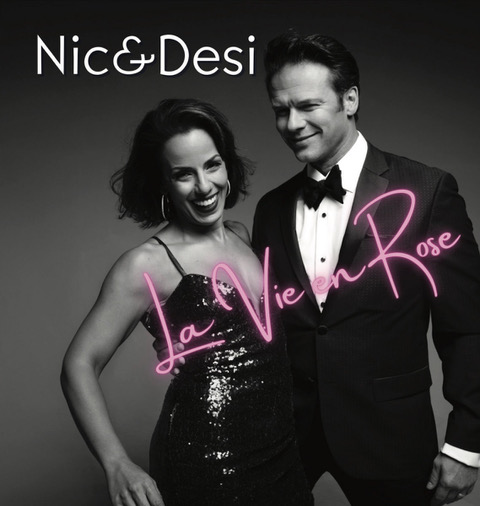Album Reviews: A Pleasurable Trio of Recent Releases
Reviewing recordings by leading cabaret vocalists may be the heavenliest job on earth, as this latest batch of new releases “required” me to spend my fleeting summer days listening over and again to three thoroughly pleasing albums – two comprising nothing but tasty, love-themed songs, the other serving up pop and show tunes that insist we look at life through rose-colored glasses. Ann Kittredge’s Romantic Notions is a trove of truly novel discoveries mined from songs you thought you knew all about, while Jane Scheckter’s I’ll Take Romance makes loving sentiments sound all too delicious, and Nic & Desi’s La Vie en Rose effuses cheery theatricality.
Romantic Notions: Intriguing Re-Imaginings of Hit Tunes
I think I’m too old to be a fangirl, but were I to not act my age, the object of my zeal would be song-reinterpretation super-hero Ann Kittredge. As I discovered from her first album, reIMAGINE (reviewed here on January 9, 2023), Kittredge reinterprets familiar pop and theatre songs in ways the rest of us would never think of in a million years. On Romantic Notions, her second album, she presents another titillating set of intriguing re-imaginings of hit tunes. Her musical imagination is startling. Her pellucid voice is ravishing. And she is cunningly accompanied by a versatile jazz trio (sometimes enriched by wind or string soloists) in keen arrangements by her pianist Christopher Denny and album consultant Barry Kleinbort.
Most striking are Kittredge’s inventive takes on Carole King’s “I Feel the Earth Move,” Bob Dylan’s “Mr. Tambourine Man,” the Jimmy Webb pop classic “Didn’t We,” and “Together Wherever We Go” (Jule Styne/Stephen Sondheim), from the 1959 Broadway musical Gypsy.
Kittredge renders King’s song, not like the propulsive anthem we’re used to cheering, but with a mysterious, airy quality that reverberates softly at first, then grows shockingly sexy as she shifts into the free, open style of a jazz vocalist. Perplexingly, she transforms the impressionistic “Mr. Tambourine Man” into an impassioned homage to an imaginary character. I think she wants us to understand worshipful admiration as a form of romance.
De-emphasizing its melodic curves, Kittredge approaches “Didn’t We” haltingly, almost stuttering its lyrics, tearfully, as she evokes a curious uncertainty. Led by Yoed Nir’s mournful cello, she mingles the song’s feelings of regret with a sense of thoughtful inquiry, complicating one’s notion of romantic endings.
Inspired by a suggestion from Kleinbort, Kittredge turns “Together Wherever We Go” into a lullaby, and one is dumbfounded by the contrast between Kittredge’s soothing vocals and the blasting sounds of Ethel Merman, for whom the song was originally written. C’mon, admit it, would it ever have occurred to you to perform any Ethel Merman show-stopper as a lullaby?
Well, one thing I’ll admit is that choosing my favorite track on Kittredge’s amazing new album results in a toss-up—between the unexpected beauty the singer finds in the melodic lines of Billy Joel’s “You’re My Home” and her creation of a high-speed, Latin ballroom-dance number out of Stevie Wonder’s “I Just Called to Say I Love You.”
I’ll Take Romance: Masterful Musicianship
A seasoned cabaret-jazz vocalist, who has been singing in New York clubs since 1974, Jane Scheckter released her first album in 1988. On her fifth, I’ll Take Romance, Scheckter’s silky, deep-pitched voice displays a veteran singer’s sophisticated command of vocal phrasing and dynamics. Her straightforward singing style consistently keeps the lyrics front-and-center, amid Ted Firth’s swinging piano-bass-and-drums arrangements of the album’s likable array of romantic pop and jazz standards.
Yet a relaxing easiness pervades the recording. While we hear heartfelt tenderness, joy, and affection, there’s no deep hurt or supreme jubilation, no emotional extremes. What we get is the “niceness” of romance. Conceptually, I’m fine with that, but aesthetically, there were too many times when I wanted Scheckter to let go, to explore the peaks—from the perils to the unbridled ecstasies—of romantic entanglement. Her plain, plodding interpretation of the fervent “My Foolish Heart” (Victor Young/Ned Washington), for example, cries out for a bigger injection of heated ardor.
Scheckter’s most exciting performances come in the latter half of her album, when she tackles songs that reflect more experienced perspectives. She does a bang-up rendition of the 1952 pop song “You Are Not My First Love” (Bart Howard/John Peter Windsor). You can hear the little wink in her eye as she imbues the confessional lyrics with slyness, playfully supported by snazzy piano accompaniment.
Played by Firth, the piano is the life of the party throughout most of the album, its light, bustling sounds working in well-balanced tandem with Scheckter’s full, deliberate vocals. It’s this complementary combination that makes the smart arrangement of Cole Porter’s “After You, Who?” an album highlight, and adding a flugelhorn into the mix for “I’m Gonna Lock My Heart (and Throw Away the Key)” (Jimmy Eaton/Terry Shand) lends a sassiness that delectably diversifies the recording’s romantic moods.
But the album’s most exquisite “added ingredient” seasons George and Ira Gershwin’s “Isn’t it a Pity,” for which Scheckter is joined by a guest vocalist, the extraordinary Nicolas King (whose album Act One: Celebrating 25 Years of Recordings I reviewed here February 15, 2021). While crystal-clear enunciation and a conversational style that spotlights the lyrics are Scheckter’s strong suits, King, with his glistening, sustained singing, brings a greater attention to melody. Performing together, their styles blend to create a shared delivery of musical sounds and emotional information that’s extremely satisfying to the ear, mind, and heart.
La Vie en Rose: Makes Us Yearn to See What We’re Hearing
After luxuriating in Kittredge’s delightful imagination and Scheckter’s masterful musicianship, one may find Nic and Desi’s La Vie en Rose, their debut album, unremarkable— though it’s certainly not unenjoyable. Featuring vocalists Nicolas Dromard and Desirée Davar, a married couple with impressive resumés as Broadway stage performers, it offers no big surprises among its straight-ahead performances of predictably arranged musical theatre, film, and pop favorites.
Yet while the album isn’t interesting enough musically to sustain a listening-only experience, one suspects that the vocal performances it records may prove wildly entertaining when experienced live onstage. It’s not predominantly their singing—some tracks include tap-dance breaks that indicate real terpsichorean skill— but largely their seductive charisma, genial outlook, and theatrical flair that fuel the duo’s appeal.
While their performances of Porter’s “I Get a Kick Out of You” and Sondheim’s “Being Alive” add little to our appreciation of those well-worn show tunes, one is especially tickled by what the couple does with “Over the Rainbow” (Harold Arlen/E.Y. Harburg), “Money, Money” (John Kander and Fred Ebb), and a pairing of two Irving Berlin tunes, “Top Hat, White Tie and Tails” and “Puttin’ On the Ritz,” all arranged by Anthony Bastianon.
Nic’s voice oozes charm. And when it merges with Desi’s breathy tones in “Over the Rainbow,” their vocals create a sonic blanket that feels like a toasty comforter you want to stay nestled within forever. Their rendering of Cabaret’s “Money, Money” is done with an actor’s affinity for character voices and funny accents, and features snappy instrumental interludes for clarinet and percussion that lend additional glee to the festivities. And the couple’s Berlin pairing, with its syncopated rhythms and the sounds of their tapping footsteps, generates a kind of performance energy that makes us yearn to see what we’re hearing.
Granted, as an album La Vie en Rose leaves one wanting—yet eagerly wanting, that is, to see this duo do their thing live onstage.
###
About the Author
Lisa Jo Sagolla is the author of "The Girl Who Fell Down: A Biography of Joan McCracken" and "Rock ‘n’ Roll Dances of the 1950s." A choreographer, critic, and historian, she has written for Back Stage, American Theatre, Film Journal International, and numerous other popular publications, encyclopedias, and scholarly journals. An adjunct professor at Columbia University and Rutgers, she is currently researching a book on the influence of Pennsylvania’s Bucks County on America’s musical theatre.







